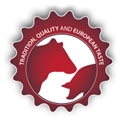 Meat is one of the basic components of the diet in Europe and important component of a traditional cuisine. For this reason, the quality and taste of meat are always of great importance, and work on their improvement is a priority. The current standards are the result of many years of European breeders’ and producers’ work. The unique taste and quality of meat is obtained through traditional breeding, but still is regulated with strict rules of animal health and welfare fields.
Meat is one of the basic components of the diet in Europe and important component of a traditional cuisine. For this reason, the quality and taste of meat are always of great importance, and work on their improvement is a priority. The current standards are the result of many years of European breeders’ and producers’ work. The unique taste and quality of meat is obtained through traditional breeding, but still is regulated with strict rules of animal health and welfare fields.
The influence on the quality of the final product has the first step, which is selection of races with respective characteristics. Conducted for many years systematic breeding work has brought improvement of meatiness, that is increase of meat content in carcass with reduced body fat in the same time. Leaner meat was obtained, but still with a great traditional taste, excellent flavor and juiciness. Factor of meat’s quality and taste is a proper nutrition. Inserting to a fodder more green fodder, corresponding to the natural way of animals’ feeding, helps to improve the composition of the tissue, the quantity and quality of obtained meat.

The development of industry, intensification of farming methods, increase of the number of processors and suppliers made introducing legal regulations concerning animal production a must. The main aim of food security policy of the European Commission is to ensure a high level of consumers’ health and interests protection. The beginning of work on Union’s integrated security system was so-called White Book issued in 2000’. The book settled out priorities for the European Food Law’s reform, established the European Food Authority, defined the set of food safety’s core principles and made changes in legislation concerning the production and processing of a meat.
Decisions have been made about creating and introducing of food’s integrated surveillance system "from a farm to a table". This system covers all stages of the production chain: fodder production, animal health surveillance, production’s hygiene and microbial conditions, food processing, marking, storage, transportation and retailing. Manufacturers and distributors, who are an essential element of the production process, are obliged not only to uphold the highest standards of quality of their products, but also to keep records of supplies, suppliers and customers. Monitoring of all stages of the production and distribution allows to identify the product, then trace its origin and the origin of its components, this is so-called "step back - step forward" system.
European Food Safety Authority (EFSA) controls the level and legitimacy of implemented law, standards and regulations. It is the expert unit, consisting experts and scientists watching over all aspects related to food safety. The department deals with the determination of standards for food products and preparation of food related legislations. The main target of its activities is to provide a high level of human’s life and health protection, including animals’ and plants’ health safety and welfare, and also care for the natural environment.
Conducted by the EFSA studies, analysis and work have contributed to the fact that the European Union is a pioneer in the field of analysis and risk management concerning food. Based on solid scientific basics, threat (risk) warning, management and communication systems and mechanisms are unmatched in the world. Thanks to it, no case of unsafe food, either cheese or meat, will not be overlooked and consumers can feel safe.
The experience of European farmers and producers in conjunction with EU’s principles of the food safety policy are the guarantee of exceptional taste and quality of European meat. Due to< the campaign "Tradition, quality and European taste" the EU meat industry experts will try to convince about it their partners during the fair Winter Fancy Food Show which will be held on 15-17 January 2012 in San Francisco.
The programme is being implemented by the Union of Producers and Employers of Meat Industry (UPEMI) – an organization grouping employers representing the meat sector in general. Through its activity, UPEMI supports and protects the interests of affiliated entities< and it is also actively involved in promoting the meat industry throughout the world. Thanks to a number of initiatives already implemented, it has become a recognized partner in many countries of the world.
For more information on the campaign “Tradition, quality and European taste” go to www.europeanmeat.eu.
European Meat
http://www.europeanmeat.eu


